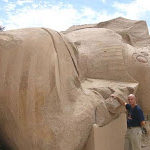(Updated February 2006)
Living the Good-Enough Life in Shanghai
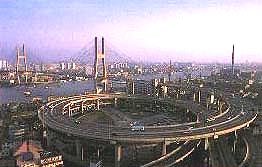 The most impressive images of central Shanghai today are it’s architectural grandeur and its material abundance. It looks and feels big with its 14 million people, its great river harbor, towering sleek skyscrapers, countless oldtown lanes, immense new airport, squeaky-clean subway and an impressive new library. The central Peoples Square is a cardiac throb of life with its museums, theatres and fountains; across town the enormous Everbright Convention Center hosts a stream of industrious exhibitions. Shanghai is very busy, very modern, wired and prosperous.
The most impressive images of central Shanghai today are it’s architectural grandeur and its material abundance. It looks and feels big with its 14 million people, its great river harbor, towering sleek skyscrapers, countless oldtown lanes, immense new airport, squeaky-clean subway and an impressive new library. The central Peoples Square is a cardiac throb of life with its museums, theatres and fountains; across town the enormous Everbright Convention Center hosts a stream of industrious exhibitions. Shanghai is very busy, very modern, wired and prosperous.
And part of this throb is the modern urban Chinese gay community. Although lesbigays are virtually invisible in public, it’s only part of the reality. Measured by western standards of activism, parades, TV and film, civil unions, and HIV organizations, gay China is no where to be seen.
But such external appearances are not the only measure of gay life in urban China today. Recently I sat with a group of gay Chinese friends at a large dining table, flooded with food, in a private dining room of an upscale hotel overlooking the entire harbor of Shanghai (the Bund). The view is magical, spectacularly Disney, a glittering display with a million city lights reflected in the busy churning waters of the dark river.
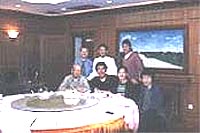 Of the nine men gathered around, six were coupled; five worked for international corporations; three owned their own apartments; six have traveled abroad; and all carried cell phones. The talk ranged from food to economics, job descriptions to relationships, gay bars in Shanghai to the best bakeries in town.
Of the nine men gathered around, six were coupled; five worked for international corporations; three owned their own apartments; six have traveled abroad; and all carried cell phones. The talk ranged from food to economics, job descriptions to relationships, gay bars in Shanghai to the best bakeries in town.
But the topics are not what I remember most. Memorable is the easy ambiance of the evening. The laughing, the playfulness among caring friends, the relaxed manner, the campy comments aimed at each other and at one of the cute waiters (who spoke no English). This was a group of men in their twenties and thirties living a lifestyle unimagined fifteen years ago in Communist China. They are out in the full light of this megalopolis, no longer confined to furtive alleys, seedy dark parks or badgered by police harassment. These gay yuppies (‘guppies’) are the faces, the voices and the lifestyle of today’s (and tomorrow’s) gay middle class Chinese.
Although, unlike the gay west with confident and strident sounds to its public march toward equal rights, the collective Chinese voice is, for now, a muted intimate voice heard mostly among such friends who keep close company while they lead industrious lives often as fulfilled as any westerner.
Forging a Community
It could be said these descriptions ignore the heavy reality of Communist rejection of homosexuality. There is no permission for the formation of any public activist group. There is barely any acknowledgment from the medical community that sexual orientation has valid variations. Except for one newsletter, obliquely called “Friends”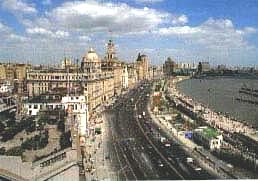 (which never uses the words ‘gay’ or ‘homosexuality’) there are no gay publications for the entire lesbigay population throughout China. Even the respected Exhibition for Chinese Ancient Sex Culture (the ‘Sex Museum’) in downtown Shanghai relegates homosexuality to a single, rather ambiguous display in its “Unusual Sexual Behavior” section.
(which never uses the words ‘gay’ or ‘homosexuality’) there are no gay publications for the entire lesbigay population throughout China. Even the respected Exhibition for Chinese Ancient Sex Culture (the ‘Sex Museum’) in downtown Shanghai relegates homosexuality to a single, rather ambiguous display in its “Unusual Sexual Behavior” section.
But this is China. Contradiction and change infuse its lifestream at the dawn of this new century. Despite such official resistance, I read a story in the English language newspaper, ‘China Daily’ about the upcoming Gay Games in Sydney in 2002. The article focused on the fact the Games expect to draw more athletes than the regular Olympics did in Sydney in 2000.
Scattered around town are several (quiet) gay bars and clubs. I had dinner at ‘Kevin’s at Vogue’ off Hengshan Road and a drink at ‘Eddie’s’ at the fabulous Grand Hyatt. Both were fashionably designed and were patronized by guppie (gay yuppie) clients sitting around chatting in subdued voices with soft Sino-pop music in the background.
As for dancing and discos, a friend sent me this comment recently: “There has been all-gay ballroom dancing room in Shanghai for some time. For some  uncertain reasons, (maybe the organizer’s social status, or the income level of customers) it caters to working class (low-income) gays. The organizer usually rents a ‘sleazy’ dancing place located in an unpopular area (for low rent), and charges very little for admission–only 5 yuan (60 cents) which includes a cup of tea.
uncertain reasons, (maybe the organizer’s social status, or the income level of customers) it caters to working class (low-income) gays. The organizer usually rents a ‘sleazy’ dancing place located in an unpopular area (for low rent), and charges very little for admission–only 5 yuan (60 cents) which includes a cup of tea.
“For higher class gay people with better incomes, there are at least two mixed disco bars. One is Real Love which has been popular for quite a few years, on Hengshan Road. The other is Park 97; it has become popular more recently.
“These two places have not been harassed by police so far, perhaps because they are mixed. However, similar bars in the past have received demands from police to be shut down, for reason not associated with gayness, but rather for drugs or prostitution.
“The scene at both discos is very active in a gay/straight social way. They are very well lit and decorated with nice atmosphere. There are many Chinese young people and quite a few expatriates. Straight people are generally open-minded about the gays and lesbians there. However, you don’t get to see gays very intimately there. They just dance there. The charges are pretty expensive, about USD$5 for a drink.”
Network vs Scene
Such activity reveals that gay China today is reasonably alive. But it is not a public movement; it is, rather, a vast network of friends and contacts throughout the country in frequent and abundant communication with one another. There is not a major or minor city where these networks don’t extend. Friends are everywhere. Connecting them now are the invisible frequencies of cell phones and the Internet-which also connects them beyond China to companions abroad as well.
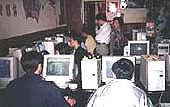 Before I left home, I e-mailed a friend whose uncle lived in Shanghai. A day later I received the uncle’s e-mail address from my friend. I then sent a note to ‘Uncle Fang’ and within a week I had an invitation to join him for dinner after I arrived. That same day I logged on to gaychina.com to see news and personal ads written mostly by gay Chinese looking to hook up with other Chinese guys or foreigners. This site is one of a number of sites, some of which are in Chinese some in English. A burgeoning virtual community is happening daily.
Before I left home, I e-mailed a friend whose uncle lived in Shanghai. A day later I received the uncle’s e-mail address from my friend. I then sent a note to ‘Uncle Fang’ and within a week I had an invitation to join him for dinner after I arrived. That same day I logged on to gaychina.com to see news and personal ads written mostly by gay Chinese looking to hook up with other Chinese guys or foreigners. This site is one of a number of sites, some of which are in Chinese some in English. A burgeoning virtual community is happening daily.
But the paranoid government censors are not asleep. It’s not unusual to log on to such a website one day and then try again the next only to see that it can’t be found. So a different one starts up in a game of cyber cat-and-mouse.
Despite such annoyances, a community of like-minded souls forms itself over time. Given natural sexual attraction, economic opportunity, high tech communication and gradual erosion of the edgy Communist system, a queer community is arising. Chinese lesbigays here will coalesce in the not-too-distant future. They will be apolitical at first, yet clearly pushing the cranky old system for some recognition, respect and equality within their ancient culture.
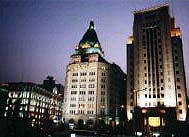 This movement will likely come about with far less violence than the gay community has faced in the West. The difference is religion– the lack of it. For the past 60 years, China has been stripped of it religions, mainly Buddhism (although the restraints have now loosened), but more significantly it has forbidden the spread of Bible-based and Koran-based religions which inject their minions with distorted dogma about sexual orientation.
This movement will likely come about with far less violence than the gay community has faced in the West. The difference is religion– the lack of it. For the past 60 years, China has been stripped of it religions, mainly Buddhism (although the restraints have now loosened), but more significantly it has forbidden the spread of Bible-based and Koran-based religions which inject their minions with distorted dogma about sexual orientation.
Granted there has been cultural opposition to homosexuality in China, especially in the past 60 years, but much of this has emerged out of passive and fearful ignorance rather than aggressive legal/religious intolerance. For all the ills that Communism has wrought on this country, it’s ironic that stripping the country of religion now leaves China with less ‘self-righteous’ fanaticism against homosexuality than other highly religious-ized cultures such as the USA or Saudi Arabia.
Prosperity and Poverty
Free enterprise will soon be in charge of China, not the Communist Party. During my visit to the northeast cities of Harbin, Dalian, Qingdao, as well as Beijing and Shanghai, it became clear that China is heading quickly down a fast and slippery course into economic freefall which the government is unprepared and unable to control.
The prosperity of these cities–reflected in new highways, sleek skyscrapers, SUVs, cell phones, an infinity of commercial goods, vast blocks of upscale apartments-is the tip of an iceberg that’s getting bigger by the month. In each of these cities there are bloated shopping centers, expanding suburbs and roads, new airports, modern buses, glass and granite hotels patronized by an emerging middle class which is far outstripping the life quality of the bigger and poorer populations of rural China.
(The shadow side of this prosperity, as reported in Asia Week, is that much of this new commerce involves illegal manufacturing and trade–counterfeiting name brands and pirating patented products sold all across Asia.)
 A small slice of the gay ‘underlife’ of this iceberg was partially depicted in the 1998 film ‘East Palace, West Palace’. This grim black and white film tells the story of an alienated gay hustler and his anxiously depressed captor, a bullying and emotionally rigid policeman who flirts semiconsciously with his sexy captive.
A small slice of the gay ‘underlife’ of this iceberg was partially depicted in the 1998 film ‘East Palace, West Palace’. This grim black and white film tells the story of an alienated gay hustler and his anxiously depressed captor, a bullying and emotionally rigid policeman who flirts semiconsciously with his sexy captive.
It is a grim scenario of erotic secrecy, shame and humiliation focused on a gay character who lives outside the privileges of education and profit. Like so many disenfranchised and impoverished peasants, including gays from the countryside, he is hobbled by China’s restrictive work permit regulations that require documents of permission to work in the cities-a feudal and unfair method of keeping provincial workers from swamping the job markets in the cities.
Poorer gays–and straights–nevertheless sneak into Shanghai from the hinterlands without much education seeking work as laborers in construction or in the food industry. Their only hope for sexual intimacy is an occasional furtive quickie; they usually know nothing about gay relationships or gay camaraderie. Others, more street savvy, come to the city to offer their hides as money boys where job security and quality of life, like dreams, are mere whispers and shadows.
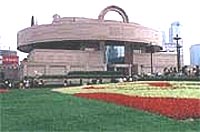 Sitting on benches in the early evening near the glowing Shanghai Museum, the ‘boys’ are all the more poignant for their impoverished sex appeal. Such underprivilege is felt more sharply among the hustle and bustle of fashionable, money-shuffling Shanghai. Poverty and sex have always traveled and travailed closely together. Provincial gay life in China is a very different story than modern urban life; for now it is a sad tale with little hope or redemption.
Sitting on benches in the early evening near the glowing Shanghai Museum, the ‘boys’ are all the more poignant for their impoverished sex appeal. Such underprivilege is felt more sharply among the hustle and bustle of fashionable, money-shuffling Shanghai. Poverty and sex have always traveled and travailed closely together. Provincial gay life in China is a very different story than modern urban life; for now it is a sad tale with little hope or redemption.
Gay Love Problems
My friend Jason and I approached Mr. Chang’s restaurant along a narrow alley squeezed between old Shanghai buildings left over from the European days when opium was the prize commodity. Just off Hengshan Road with its long rows of poplar trees overhanging the busy traffic, trendy cafes and neon-framed clubs. Chang’s is set back in an anonymous alley that leads to the bright lights and bevel glass doors of the popular restaurant. Jason and I sat in one of several dining rooms sorting through a menu with a hundred or more items ranging from fried chicken feet to jelly-fish heads, but he mercifully selected half a dozen less exotic delicacies for dinner.
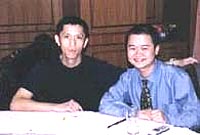 Jason is very fluent in English and can delineate the subtle aspects of relationships and life which gay men in modern Shanghai experience daily. This particular evening he is pleased and feels especially grateful because he has found a loving relationship after years of wondering and looking. “I am very happy that Stan and I get along so well. It has long been my dream to find a man who offers back what I give.” I agree with him. Jason is a caring person who has extended his warmth and kindness each time we have met.
Jason is very fluent in English and can delineate the subtle aspects of relationships and life which gay men in modern Shanghai experience daily. This particular evening he is pleased and feels especially grateful because he has found a loving relationship after years of wondering and looking. “I am very happy that Stan and I get along so well. It has long been my dream to find a man who offers back what I give.” I agree with him. Jason is a caring person who has extended his warmth and kindness each time we have met.
He met Stan through a friend and both sensed in each other a lack of ‘attitude’ or posturing so common in public gay bars and clubs. They both felt at ease with each other; there was no devious or manipulative effort. “He treats me with such gentleness. He is intelligent and listens well. He is sensitive to others who are poorer than he is–and I think he is so handsome,” Jason explains as his dark eyes look up trying to capture in words the elusive elements of romance.
As he spoke, I thought this is the new heart of gay China–two men in love with each other and realistically expecting a future of fused dreams. They are not alone in this vision: several of their friends have succeeded in holding together love relationships for years.
Do your parents know you are gay, I asked?
“In China we have what you call ‘don’t ask, don’t tell,’ he replied. My family knows but they don’t talk about it with me. My mother has said she wants me to be happy and I think that’s her way of saying she knows. But I still have to be careful. In China, gossip about a person’s family is the worst punishment–worse than violence. I would never want to embarrass them with my sexuality… But we’re still close and I see them every week.”
Does Stan’s family know he is gay?
“Stan told his sister and his sister told his mother. His father probably knows but won’t say anything to Stan. He loves Stan and knows that he’s a good son and appreciates the respect he shows. Stan’s mother said she only wants Stan to be ‘safe and natural’. I think she meant that he shouldn’t dress or act in an extravagant manner. It’s probably some stereotype she has about gays from TV. Stan and I visit his family every other week so I bring gifts for his parents… I heard they like me and think I’m a ‘good catch’ for him!”
Class Distinctions in China
Jason and Stan’s relationship also raises an important issue that influences their long-term potential: class. Stan works six days a week in a restaurant. He has no high school diploma and earns about US$250 a month. He doesn’t mind this modest work life and has little desire to aspire to a higher ‘career’. On the other hand, Jason works five days a week for a multinational corporation, travels abroad, has a college degree and intends to get an MBA; he earns more than four times Stan’s salary, a very good wage in modern China.
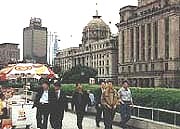 The potential problem is silent but forceful: in China there are distinct economic divisions among the working public. Low, middle and upper classes are real , despite three generations of supposed egalitarian Communism that should have leveled the field. (It never did since power is a corrupting force and the Communist leaders still live like princes.)
The potential problem is silent but forceful: in China there are distinct economic divisions among the working public. Low, middle and upper classes are real , despite three generations of supposed egalitarian Communism that should have leveled the field. (It never did since power is a corrupting force and the Communist leaders still live like princes.)
Now, with the sweeping economic changes churning among (some of) China’s billion-plus masses, class distinctions have become even more pronounced; there are now more princes and a lot more paupers–and the distinctions are even more evident now.
This was evident to Jason when he first introduced Stan to his friends one evening for dinner. It was the first time Stan the waiter had met this circle of college educated, career-track professionals with hefty incomes.
Seated around the table were a doctor, dentist, journalist, travel agent, an executive-level employment consultant and a marketing supervisor. Strangely, even among these loving friends, Jason and Stan felt a slight uneasiness–even though everyone was cordial and friendly. A few days later, Jason noticed that no one said anything to him afterwards about Stan. No playful kidding about Stan’s good looks. No campy gossip about their budding romance. Their silence seemed to speak of an unexpressed–and very likely unintended– attitude toward this working class lover.
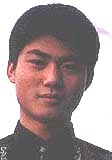 But silence can work both ways: it can discern and divide but it can also leave open a door of possibility for movement in ideas and feelings. None of the friends disliked Stan and he was polite and friendly toward them. They were also very aware that their dear friend Jason had wanted a relationship so they expressed sincere happiness for him and Stan, at least during that evening together.
But silence can work both ways: it can discern and divide but it can also leave open a door of possibility for movement in ideas and feelings. None of the friends disliked Stan and he was polite and friendly toward them. They were also very aware that their dear friend Jason had wanted a relationship so they expressed sincere happiness for him and Stan, at least during that evening together.
In the subsequent months, Jason reported, “most of my friends have changed their reactions as they see how happy we are together.”
But Jason is realistic about the future and he expressed some of his own doubts. Stan is not interested in career-track corporate life. His ambitions lie within his own hands-on efforts and experience as a food industry worker. He will always earn considerably less than Jason and the relationship will always be unbalanced financially. To complicate matters, Jason is considering the possibility of immigrating to Canada some day and is, of course, concerned how Stan can fit into this plan. It’s a potential impasse which he said he would take one day at a time. For now, he is joyful to be still falling in love.
Finally
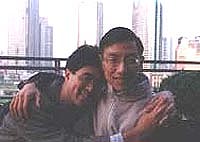 The story is about modern gay men in modern Communist China. There are new opportunities, new feelings and new choices that have never been available before to these folks. They are also engaged not just with many of the constraints and encumbrances of a cranky governmental system, but with some of the same age-old challenges of love, friendship and livelihood.
The story is about modern gay men in modern Communist China. There are new opportunities, new feelings and new choices that have never been available before to these folks. They are also engaged not just with many of the constraints and encumbrances of a cranky governmental system, but with some of the same age-old challenges of love, friendship and livelihood.
——————–
Comment posted on Lonely Planet Thorn Tree (May 2004):
I live in Shanghai now but I was in Beijing a few weeks back.The bar scene is alive and well. On/Off bar can be fun. It’s similar to a European gay bar–surprisingly upscale for Beijing and is certainly the most slick gay bar in the capital. Drinks are reasonably priced. The bad news is that the music sucks–anonymous techno. The good thing is that the people are very friendly. There is no problem going alone here and people are pretty welcoming. It can be very busy on the weekends. Despite being pretty big it gets packed. Weeknights can be dead and may close early. Also try the Half and Half bar not far away. A smaller, darker bar said by many to be only a money boy hang out but it’s actually a very friendly place. The waiters here are cool with some hilarious drag shows at the weekend. A couple of other bars (like DragOn) have gone so these two now seem to be the main players. If you need it local guys will really help you out and they’re often keen to make contact with foreginers. Websites: try www.gaychina.com, www.gay.com, www.gaydar.co.uk or the classified ads on www.thatsbeijing.com.
Also see:
Gay China Stories
Gay China News & Reports 1997 to present
Gay China Photo Galleries



